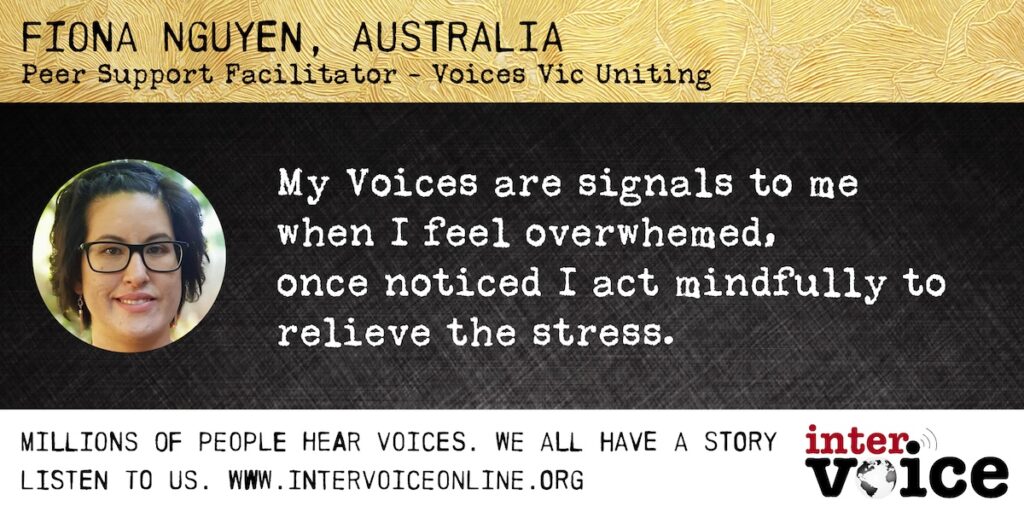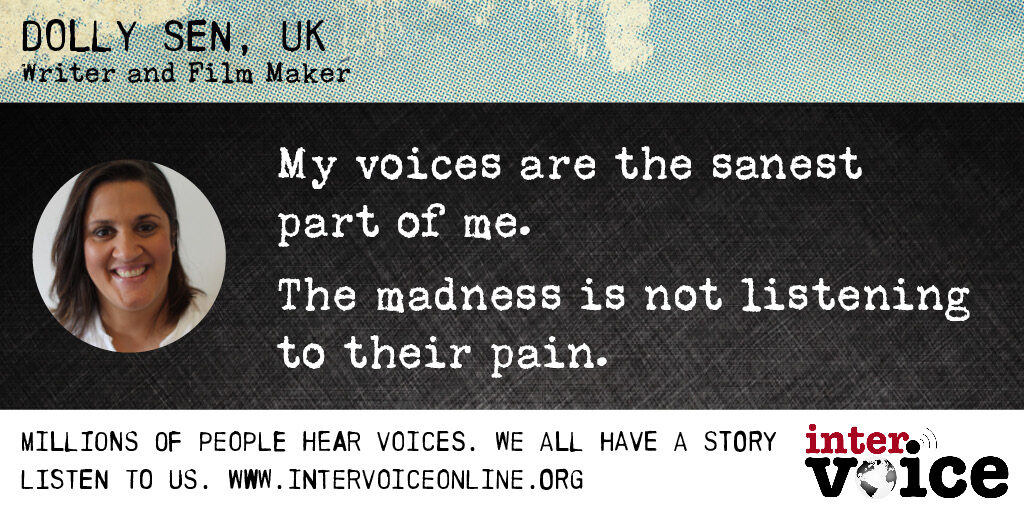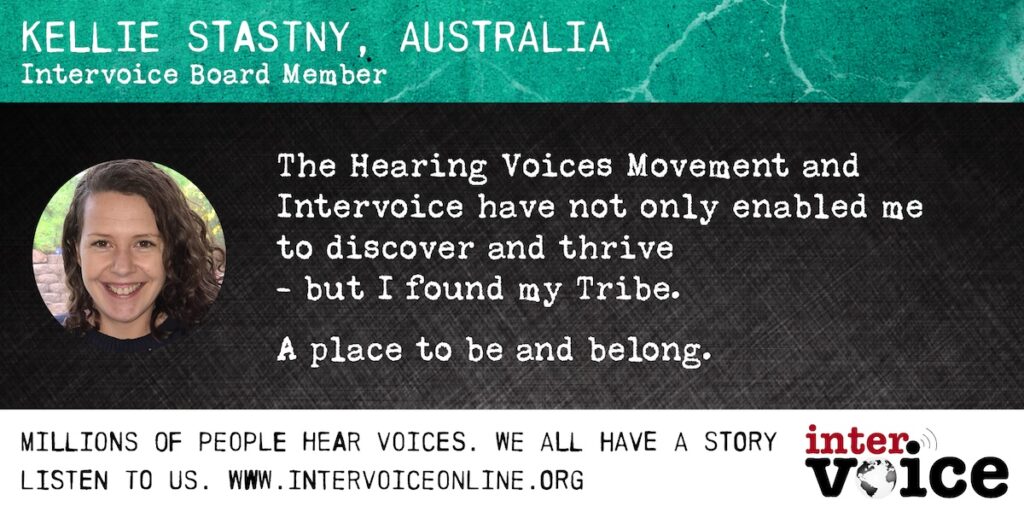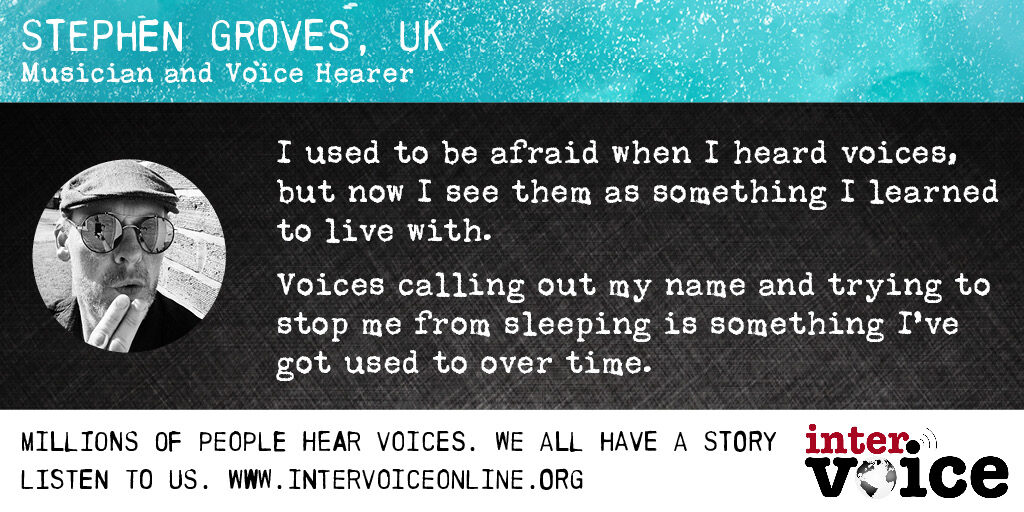Introduction
This is an open letter from INTERVOICE to Allen Frances, Professor Emeritus at Duke University, about an article he published in the Huffington Post entitled Psychiatry and Recovery: Finding Common Ground and Joining Forces.
Professor Frances is an influential American psychiatrist best known for chairing the task force that produced the fourth revision of the Diagnostic and Statistical Manual (DSM-IV) and for his more recent critiques of the current version, DSM-5.
His article was written in reaction to an Op-Ed by Eleanor Longden, an INTERVOICE board member, published in the Huffington Post entitled Why I Thank the Voices in My Head. This article followed up the very well-received video of Eleanor’s TED talk about her experience of hearing voices. Within a month of being posted online, the video of her speech has been viewed on the TED website over 780,000 times and on YouTube a further 58,000 times.
This open letter addresses the points of concern we have about his article and seeks to initiate a dialogue, both with Professor Frances, and others who are concerned and disheartened about the direction that psychiatry is taking.
We have over 140 signatories.
Further reading and resources about the hearing voices approach.
You can download the letter here, if you wish to send it to others:
The Open Letter
14 September 2013
Dear Professor Frances
Regarding your article Psychiatry and Recovery: Finding Common Ground and Joining Forcespublished in the Huffington Post on 24August 2013, in response to the article and TED speech by Eleanor Longden about hearing voices.
We are writing to you on behalf of INTERVOICE, an international organisation founded in 1997. INTERVOICE supports a worldwide community of networks and groups in 27 countries; an alliance of people who hear voices, friends, family members, and mental health professionals.
We are conscious of your significance as a respected and influential critical thinker, and wanted to take up your challenge to find common ground and join forces.
We decided to write this as an open letter. This is because we want it to be seen by the hundreds of thousands of people who have watched the video of Eleanor’s speech, and to initiate a dialogue with you and others who are concerned and disheartened about the direction that psychiatry is taking and who are seeking new and more positive directions.
We want to correct a number of, perhaps unintentional, misassumptions about Eleanor’s recovery journey (and the INTERVOICE approach which underpins it) that you have made in your article.
This is because you make the following statements:
The approach “may sometimes be harmful, even dangerous” and is “not a safe blueprint for most people who suffer from what we call schizophrenia.”
It is not possible to “draw general conclusions” from Eleanor’s experience.
Eleanor’s experience of voices is in some way different because “most voices are overwhelming and require medicine …”
We want to reassure you that our experience shows that this is not the case by directly responding to these points.
From reading your article it appears you may be unaware of the substantial and long term work that has been carried out by members and allies of INTERVOICE.
We have been researching hearing voices for more than 25 years in partnership with people who hear voices, like Eleanor (who is a trustee and coordinator of our Research Committee). Our work began in the Netherlands in 1987 and has subsequently connected researchers around the world. This work has led us to very different conclusions from those you reach in your article.
This research has involved a long term, detailed, and thorough investigation of the experience of people who hear voices. Whilst this research, and the working approach that ensues, is relatively new to the United States, it is well known, long established and well respected in many other countries, including Australia, New Zealand, and much of Western Europe.
It is also important to emphasize that Eleanor’s experience is by no means unique. Many voice hearers, including thousands supported by the Hearing Voices Movement, have undergone similar recovery journeys. The fact that this is not well known is part of the problem that psychiatry in the Western world faces; to date, it has shown limited interest in individual success stories, or sought to learn from them.
With respect to the fears you express about the potential dangers and harmfulness of the innovatory approach endorsed by INTERVOICE, we have seen no evidence base that substantiates such fears. On the contrary there is a growing body of research that shows the benefits of working in an emancipatory, collaborative way with people diagnosed with schizophrenia.
INTERVOICE and our supporters want to take the opportunity to outline both for you, and other readers of this letter, our research findings that are drawn directly from the experiences of people who hear voices:
Prevalence of voice hearing in adults and children. Large-scale epidemiological studies have shown that about 4-10 % of the adult population hear voices at some time in their lives. Only about a third seek assistance from mental health services. The proportion of children who hear voices may be even higher and, again, only a minority are referred for treatment. It is therefore wrong to assume that voice hearing is always a pathological condition requiring psychiatric assistance. Hearing voices, in itself, is not specific to the diagnosis of schizophrenia.
Link to trauma and adversity. A common theme in research with both adults and children is the relationship between hearing voices and distressing experiences. In adults, around 75% begin to hear voices in association with a specific trauma, loss, or situations that make them feel powerless (for example, bereavement, divorce, losing a job, or more chronic victimisation such as physical, emotional, and/or sexual abuse). The role of adversity was identified in 85% of children studied (for example being bullied by peers or teachers, the experience of abuse, being unable to perform to the required level at school, or being admitted to a hospital because of a physical illness). In short, research has shown that in many cases voice hearing is best and most usefully understood as a reaction to a situation or a problem that a voice hearer is struggling to cope with.
Voices have a meaning. A striking finding is that what the voices say often gives an indication of the social and emotional problems experienced by the voice hearer. What we see from research by Prof. Marius Romme and Dr. Sandra Escher (the co-founders of the Hearing Voices Movement), as well as from many other investigators, is that if attention is given to the problems the voice hearer is facing then they are able to establish a more constructive, peaceful relationship with their voices. As a result they become less fearful of, and intimidated by, the voices they hear. When a voice hearer is able to consider the problems that are at the root of their distress, and the associated emotions and feelings, the voices stop being their only focus of attention. Although you comment that Eleanor’s experience of voices might be considered atypical because “most voices are overwhelming”, we believe that it is very clear in the TED talk that this was also the case with her. What enabled positive change was when she learned to interpret the voices in a different way and therefore relate to them more peacefully.
Living and working with people who hear voices. A key to understanding the problem is the current, predominantly negative attitudes towards voice hearers in the Western world. In Western societies, hearing voices is generally associated with ‘madness,’ dangerousness, and abnormality. However, in other cultures (and in Western societies historically), hearing voices was often considered as meaningful and normal for gifted members of society. Nevertheless many people, whether laypersons or psychiatric professionals, do not know how to relate respectfully to someone who hears voices, or to adopt more positive attitudes towards voice hearing. A confrontation with a voice hearer provokes either rejection or silencing. Typically, this lack of understanding can perpetuate misconceptions, which in turn can have a number of adverse effects on people who hear voices, including an impact on their self-esteem, feelings of disempowerment, hopelessness, helplessness, and social exclusion. It may also limit opportunities for people to explore and understand the voices they hear. The biomedical model typically advocates that the ultimate answer to patients hearing voices is to find a way to suppress the voices, and communication about the voices between professionals and voice hearers is frequently discouraged. This approach probably originates from the mistaken belief that talking about voices reinforces delusional beliefs and that emotions might get out of control. However, in our experience – as well as that of many cognitive therapists who work with people with a diagnosis of psychosis – talking with voice hearers does not provoke or intensify psychotic states. On the contrary, most voice hearers find it helpful and liberating to be respectfully questioned about their voice hearing experiences and feel acknowledged, respected, and empowered by it. For some voice hearers, this kind of assessment produces profoundly positive changes. Many doctors and other professionals who have learned to work in this way have also reported that it frees them too, helping to forge genuinely insightful, healing relationships with patients. In this respect, collaborative alliance is a key aspect of the INTERVOICE approach. This is exemplified by Eleanor’s TED talk, which emphasized the importance of a productive fellowship between herself, medical professionals, family members, and other voice hearers.
You have spoken and written many times about how too many individuals are being diagnosed and treated for mental illness. We join you in believing that to be so. We would like to add that from the perspective of those being diagnosed, the effect of labelling people who hear voices as schizophrenic, then subjecting them to powerful psychotropic medication and periodic hospitalization is damaging. In our experience it is often the least likely way to help resolve their problems. Indeed, for many the opposite is the case: voice hearers treated in this way will simply find themselves further disempowered and their physical health compromised. The great success and popularity of the many hearing voices peer-support groups established around the world are testimonies to the benefits of accepting voices as a real and meaningful experience that can be understood, coped with successfully, and lived with productively.
We are aware of some concerns expressed by medical practitioners and family members in your country about our position on the use of psychiatric medication. We want to state that we do not encourage people who hear voices to stop taking medication. However, we do support people to make informed choices made on the basis of full disclosure of the positive and negative effects that medication can have. Significantly, it is well documented that there are many people who hear voices with the diagnosis of schizophrenia who have recovered successfully without long term medication use.
Our fear is that your analysis may encourage a mind-set which suggests the only viable option for voice hearers is unnecessary, chronic dependence on psychiatric care (with the attendant, well-documented risks and limitations of long term neuroleptic use). It is very important to recognise that hearing voices, in itself, is not a sign of psychopathology. We acknowledge that you have spoken about this in Toronto in May 2012 for TVO’s The Agenda With Steve Paiken. We hope you will agree with us that for those who are troubled by their experiences, we consider the important question is not “what’s wrong with you?” but rather “what’s happened to you?” By taking this approach we all have much to learn about how we can help people heal and live a life that they regard worth living.
The Hearing Voices Movement is perhaps unique in that since its inception we have always emphasized alliances between experts-by-profession and experts-by-experience. As you say, finding common ground and joining forces. We want you to know that this way of working is not simply a possibility but one that is already being enacted by many people in many countries around the world. From this shared experience, the idea emerges in many minds that medicine has much to learn about supporting and healing people who are going through difficult experiences. Medicine itself might learn a few things by working more closely with organizations like the Hearing Voices Movement.
We would like to invite you to work with us. Perhaps you could come to the World Hearing Voices Congress in Melbourne, Australia in November 2013?
In conclusion we hope you will give consideration, as you suggest in the title of your article, “to join forces” with us in order to show the other side of the story. That story is one of hope, optimism, emancipation, and a focus on holistic, whole-life recovery. Please join us in what is essentially a shared cause: supporting distressed individuals in reclaiming ownership of their voices, their experiences, and their lives.
If there is some way we could help make this happen, please contact us.
We look forward to hearing from you on the issues raised in our letter.
Yours sincerely,
Prof. Alexandra Adame – Assistant Professor of Psychology, Seattle University, Seattle, WA: USA
Dr. Kirsty Agar-Jacomb – Clinical Psychologist, Early Psychosis Intervention Team, Waitemata District Health Board, Auckland: New Zealand
Rob Allison – Mental Health Lecturer, University of York: UK
Kirsty Anderson – Counsellor and support worker adult mental health: UK
Angelo Arecco – Expert by experience and translator of writings about hearing voices, Savona: Italy
Paul Baker – INTERVOICE Social Media Coordinator: UK
Suzanne Beachy – Mother, Columbus, Ohio: USA
Prof. Richard Bentall – Professor of Clinical Psychology, University of Liverpool: UK
Prof. Lisa Blackman – Goldsmiths University of London, author of Hearing Voices; Embodiment and Experience: UK
Prof. Mary Boyle – Professor Emeritus of Clinical Psychology, University of East London: UK
Will Brady – Human Rights Officer, Whiting Forensics Division, Connecticut Valley Hospital, Middletown, CT: USA
Dr. Caroline Brett – Clinical Psychologist, Sussex Partnership NHS Foundation Trust, Brighton & Hove EIPS: UK
Dr. Anita Brewin – Consultant clinical psychologist, Bradford Early Intervention in Psychosis Service: UK
Berta Britz – Certified Peer Specialist, MSW, ACSW (Voice Hearer by experience); Coordinator of Montgomery County Hearing Voices Network, Pennsylvania: USA
Wendy Brooke – Independent Mental Health Advocate and Counsellor: UK
Dr. Liz Brosnan – Survivor Researcher, Galway: Ireland
Peter Bullimore – Mental health trainer and consultant for the Hearing Voices Network, National Paranoia Network and Asylum Associates: UK
Bernadette Bushe – Facilitator Hearing Voices Dublin Group and Proud Mother of a voice hearer, Dublin: Ireland.
Joe Calleja – Chief Executive Officer, Richmond Fellowship of Western Australia: Australia
Prof. Tim Carey – Associate professor, deputy director, head of research, Centre for Remote Health, joint centre of Flinders University and Charles Darwin University: Australia
Roberta Casadio – Clinical psychologist, Faenza: Italy
Prof. Cristiano Castelfranchi – Professor of General Psychology, University of Siena; Former Director of the Institute of Cognitive Science – National Research Council: Italy
Neil Caton – Mental Health Worker with experience of psychosis, Lancashire: UK
Natasha Coleman – Senior Communications Officer, Rethink Mental Illness, London: UK
Dr. Steven Coles – Clinical psychologist, Nottinghamshire Healthcare NHS Trust: UK
Kellie Comans – Voice hearer, Community Support Worker and Young Carer Project Worker at Gateway Health Wodonga: Australia
Dr. Dirk Corstens – Psychiatrist and Chair of INTERVOICE: The Netherlands
Sharon Cretsinger – Voice Hearer and Psychiatric Survivor, ICON, INAFA. Founder and Director of the Kent Empowerment Center, Kent, Ohio: USA
Hywel Davies – Chair of the Hearing Voices Network Cymru; Honorary Board member of INTERVOICE: UK
Brian Dawn – Director of Mind in Camden, London: UK
Indigo Daya – Program Manager, Voices Vic (The Hearing Voices Network of Victoria), Prahran Mission; independent recovery trainer, speaker and consultant: Australia
Yann Derobert – Clinical psychologist, Coordinator of the French Hearing Voices Network: France
Jacqui Dillon – Voice hearer and Chair of Hearing Voices England: UK
Carol Dugdale – Facilitator Hearing Voices Network recovery/social groups; registered medium, healer and Jungian astrologer, Stockport: UK
Megan Edwards – Lecturer in CBT, University of York: UK
W. Francis Elling – Visual Artist: USA
Jorn Eriksen – Director of Social Psychiatric Services, Lyngby; INTERVOICE trustee: Denmark
Dr. Sandra Escher – Honorary Research Fellow, City University of Birmingham; Co-founder of the Hearing Voices Movement: The Netherlands
Dr. Fabrizio Esercitato – Nurse and Working to Recovery Ltd. volunteer, Faenza: Italy
Trevor Eyles – Voice Hearing Consultant, Dept. of Social Psychiatry, Municipality of Aarhus: Denmark
John Exell – Voice Hearer, Hearing Voices Group Facilitator, Artist, Sculptor and Writer, Teacher, Member of Mensa, Retired Architect’s Assistant: UK
Chelsie Falconer – Events Officer, Voices Vic (The Hearing Voices Network of Victoria), Prahran Mission: Australia
Dr. Karen Flowerdew – Consultant clinical psychologist, York NHS Trust: UK
Lisa Forestell – Director of Community Supports, Western Massachusetts Recovery Learning Community; Board member, Hearing Voices: USA
Nicky Forsythe – Psychotherapist and founder of Talk for Health: UK
Jill Fuller – Psychodynamic counsellor, therapist and BACP member: Antigua and Barbuda.
Jonathan Gadsby – Registered psychiatric nurse; PhD researcher Birmingham City University: UK
William (Bill) E.G. George – MA philosophy and psychology, diagnosed as schizophrenic, Dordrecht: The Netherlands
Dr. Harry Gijbels – Senior Lecturer, Mental Health Nursing, University College Cork: Ireland
James B. (Jim) Gottstein – President/CEO PsychRights: USA
Penny Gripper – Voice Hearer, Member of Carmarthen Hearing Voices Group: UK
Dr. Anjula Gupta – Consultant clinical psychologist, Leeds & York Partnership NHS Foundation Trust; Honorary lecturer, University of Leeds: UK
Dr. Dave Harper – Reader in Clinical Psychology, University of East London: UK
Dr. David Harvey – Clinical psychologist, York and Selby Early Intervention in Psychosis Service: UK
Kevin Healey – Coordinator, Toronto Recovery Network: Canada
Shelley Heath – Social work student and peer support, Queensland: Australia
Sam Higgins – Consumer Consultant and Hearing Voices Recovery Group Facilitator, Northern Sydney Area Health Service: Australia
Heath Hodge – Community mental health social worker with lived experience, San Francisco, CA: USA
Guy Holmes – Clinical psychologist, South Staffordshire and Shropshire Healthcare NHS Foundation Trust: UK
Prof. Gail A. Hornstein – Professor of Psychology, Mount Holyoke College: USA
Arnfríður Hanna Hreinsdóttir – Mental health support worker: Iceland
Joseph Huddlestone – Member of York Hearing Voices Group: UK
Derry Hunter – Mental health educator and service-user, Cheshire and Wirral Partnership Trust: UK
Dr. Rhodri Huws – Consultant Psychiatrist, Sheffield; Secretary Critical Psychiatry Network: UK
Chris James – Mental health activist and Launchpad volunteer: UK
John Jenkins – President of the International Mental Health Collaborating Network; Consultant to World Health Organisation; INTERVOICE trustee: UK
Ben Johnson – Healthcare Support Worker, Bradford Early Intervention in Psychosis Service: UK
Dr. Lucy Johnstone – Consultant clinical psychologist: UK
Atukunda Joseph Kahigiriza – Coordinator, Heartsounds Uganda, Kampala: Uganda
Alastair Kemp – Voice hearer and DPhil Candidate Social and Political Thought, University of Sussex: UK
Prof. Peter Kinderman –Professor of Clinical Psychology, University of Liverpool: UK
Ute Maria Kraemer – EX-IN Experienced Involvement trainer in peer support work education; MSc Mental Health Service Research Graduate, Institute of Psychiatry, King’s College London: UK
Ruth Lambley – MSc student, University of York: UK
Dr. Janet Lambley – Retired public health consultant: UK
Julie Leonovs – Post graduate psychological researcher: UK
Lee Little – Psychiatric nurse and hearing voices group facilitator: Denmark
Mirko Liverani – Nurse, psychiatric rehabilitation A.U.S.L Ravenna: Italy
Eleanor Longden – Voice hearer; doctoral researcher, University of Leeds; INTERVOICE trustee: UK
Peggy Maccolini – Training Coordinator, Montgomery County Department of Behavioral Health Bridgeport, PA: USA
Lyn Mahboub – School of Occupational Therapy and Social Work, Curtin University; Recovery Advisor and Manger of the Australian Hearing Voices Network: Australia
Dr. Marcello Marcario – Psychiatrist, Community Mental Health Centre, Carcare; President of the Italian Hearing Voices Network: Italy
Dr. Robyn Martin – School of Occupational Therapy and Social Work, Course Coordinator postgraduate mental health, Faculty of Health Sciences; Curtin University: Australia
Dr. Rufus May – Clinical psychologist, Bradford Early Intervention in Psychosis Service: UK
Dr. Simon McCarthy-Jones – Research Fellow, Macquarie University: Australia
Ciara McEnteggart – Doctoral Researcher, Department of Psychology, National University of Ireland Maynooth: Ireland
Julie McPherson – Hearing voices group facilitator, The Hive – SAMH, Edinburgh: UK
Nancy Metzger – San Bernardino, CA: USA
Lydia Milburn – Registered nurse, Bradford Teaching Hospitals: UK
Michelle Mogg – Community mental health nurse, Bath: UK
Matthew Morris – Director of Operations, Stepping Stones West: UK
Prof. Andrew Moskowitz – Professor in clinical psychology, University of Aarhus; Director, ADiTS Research Unit; Board member, ESTD; Board member ISPS: Denmark
P.J. Moynihan – Independent Film Producer, Digital Eye Productions: USA
John Murphy – Chairperson, Solas Drop In Centre, Monaghan: Ireland
Amy Nieschmidt – Community mental health nurse, Leeds: UK
Sophie Nixon – Member of York Hearing Voices Group: UK
Donna Murray – Volunteer peer support Hearing Voices Network of Western Australia: Australia
John Owen – Chapel Hill, NC/UNC alum next to Durham/Duke: USA
Darby Penney – President, The Community Consortium, Inc., Albany, NY: USA
David Perham – Parent, Eugene, OR: USA
Andy Phee – Community Mental Health Nurse, London: UK
Nigel Peirce – Community mental health nurse, activist and survivor: UK
Raffaella Pocobello – Independent Researcher, Rome: Italy
Dr. Michael Putzke – Psychiatrist, psychoanalyst, group analyst, head physician Klinik für Psychiatrie und Psychotherapie, Friedberg: Germany
Damien Quenson – Psychiatric Nurse, member of REV (Hearing Voices Network France): France
Kate Quinn – Clinical psychologist, Sheffield: UK
Carol Rea – Retired Occupational Therapist Mental Health Services, Tasmania: Australia
Prof. John Read – Professor of psychology, University of Liverpool: UK
Nick Redman – Bristol Hearing Voices Network: UK
Dr. Sarah Richards – Chartered clinical psychologist, Bradford: UK
Shilo Rives – Production Assistant, Digitalis Education Solutions, Inc, Port Orchard, WA: USA
Dr. George Robson – Clinical psychologist, London: UK
Prof. Marius Romme – Honorary Research Fellow, City University of Birmingham; Co-founder of the Hearing Voices Movement: The Netherlands
Cath Roper – Consumer Academic, Centre for Psychiatric Nursing and lecturer, Department of Nursing, University of Melbourne: Australia
Olga Runciman – Voice hearer and Chair of the Danish Hearing Voices Network: Denmark
Sally Sampson – Arts and Interpersonal Psychotherapist CAMHS, Lancashire Care NHS Trust: UK
Pete Sanders – Author, retired therapist and clinical supervisor: UK
Anna Scott – Member of London Hearing Voices Self-Help Group: UK
Carolyn Spring – Director of PODS (Positive Outcomes for Dissociative Survivors): UK
Olatunde Spence – Art Psychotherapist, Manchester: UK
Roy Stanworth – Mental Health Support Worker, Assertive Outreach Team, Wakefield: UK
Dr. Alison Summers – Consultant psychiatrist and psychotherapist; Committee member for UK network of ISPS (International Society for Psychological and Social Approaches to Psychosis): UK
Karen Taylor – Registered nurse; Director, Trainer and Recovery Champion, Working To Recovery Ltd.: UK
Prof. Phil Thomas – Honorary Visiting Professor, Social Sciences and Humanities, University of Bradford; formerly consultant psychiatrist, Bradford District Care Trust: UK
Dr. Sami Timimi – Consultant child and adolescent psychiatrist; Director of Medical Education,Lincolnshire Partnership Foundation NHS Trust; Visiting Professor of Child and Adolescent Psychiatry, Faculty of Health and Social Sciences, Lincoln University: UK
Joanne Trouvé – Aunt of a person who hears voices: UK
Margaret Turner – Secretary, UK Soteria Network; former mental health social worker: UK
Jo Twist – Voice hearer, Leicester: UK
Ron Unger – Therapist and educator, Eugene, OR: USA
Dr. Filippo Varese – Trainee clinical psychologist, University of Manchester; Honorary Research Associate, University of Liverpool: UK
Joel Waddingham – Student mental health nurse: UK
Rachel Waddingham – London Hearing Voices Project Manager; executive committee member of International Society for Psychological and Social Approaches to Psychosis UK: UK
Amanda Waegeli – Coordinator Hearing Voices Network Western Australia: Australia
Dr. Michael Watts – Former National Programme Coordinator GROW: Ireland
Jayne Whitney – Mental Health Nurse, Neath/Port Talbot Hearing Voices Support Group, Wales: UK
Sophie Wickham – PhD student and researcher, University of Liverpool: UK
Dr. David Williams – Consultant clinical psychologist, Norfolk & Suffolk Foundation Trust: UK
Dr. Helen Williams – Clinical psychologist, Leeds: UK
Jason Williams – Peer support worker/counsellor, Personal Helpers and Mentors, JobCo Balwyn, Victoria: Australia
Gerdt Wind – Voice hearer, Arhus: Denmark












